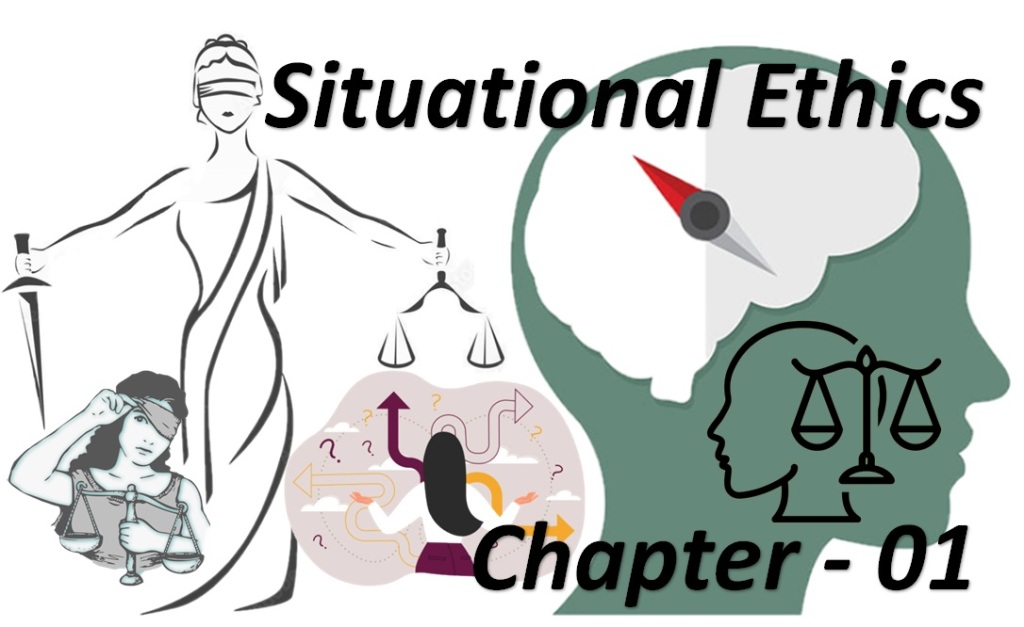
Situational ethics, or situation ethics, is a teleological and consequential theory of ethics concerned with the outcome of an action as opposed to an action being intrinsically wrong as in deontological theories. The theory was principally developed in the 1960s by the Christian Episcopal priest Joseph Fletcher. He argued that sometimes moral principles could be cast aside in certain situations if love is best being served. He believed that there are no absolute laws other than the law of love, and that all the other laws were secondary. This means that all the other laws may be broken if other courses of action would result in more love. Thus, in the case of situational ethics, the ends can justify the means.

Joseph Fletcher (1905–1991), in his time, developed what he called an ethical non-system. His publication was questioned amongst the public because it legitimized the general post-war dissatisfaction with authority. The English term “situation ethics” was taken from the German Situationsethik. It is unclear who first coined the term either in German or in its English variant.
At the time it was written, it seemed to make some radical claims such as that it is not wrong to have extramarital sex, to be homosexual, or to have an abortion. All that said, Fletcher’s work is not widely discussed nor respected in philosophical circles. Fletcher called this ethical “non-system” Situationism.
A few instances from the epic- The Ramayana- illustrate this. The Bible also has a few illustrations.

Because of its consequentialism, situational ethics is often confused with utilitarianism, because utilitarianism’s aim is the greatest good for the greatest number, although situational ethics focuses more on creating the greatest amount of love and it also has different origins. Having said that, however, situational ethics can also be classed under the ethical theory genre of ‘proportionalism’, which says that ‘it is never right to go against a principle unless there is a proportionate reason which would justify it’. Through situational ethics, Fletcher attempted to find a ‘middle road’ between legalistic and antinomian ethics.
The Meaning & Context of Agape

Our world has many definitions of love, but we most commonly think about love in a romantic sense. What if true love meant more than romance? What if there was a deeper, fuller expression of love?
The concept of agape has been widely examined within its Christian context. It has also been considered in the contexts of other religions, religious ethics, and science. For instance, in the New Testament, agape refers to the covenant love of God for humans, as well as the human reciprocal love for God; the term necessarily extends to the love of one’s fellow human beings. Some contemporary writers have sought to extend the use of agape into non-religious contexts.
The Three Views Of Situational Ethics
Situational ethics relies on one principle—what best serves love. According to Fletcher, love is unconditional and unsentimental. Situational ethics is based on the golden rule “love your neighbor as yourself” and altruism, which is putting others before yourself and showing agape (a greek interpretation of love – discussed shortly) towards everyone. It agrees on reason being the instrument of moral judgments, but disagrees that the good is to be disconcerted from the nature of things. All moral decisions depend on what the most loving thing to do is.
Fletcher says there are two unattractive views in ethics: “Legalism” and “Antinomianism”, and one attractive view, which sits in between them: “Situationism”.
Legalism: Someone who is following the system of Legalism is someone who “blindly” observes moral rules without being sensitive to the situation. For example, we ought to tell the truth in all situations, even if this means that, say, millions of people die. In 2002 the religious police of Saudi Arabia refused to let a group of girls escape from a burning building because they were wearing “inappropriate” clothing, which was against the will of God. Fifteen girls died.
Reference:
‘Saudi Police “Stopped” Fire Rescue’, BBC News (15 March 2002), freely available at http://news.bbc.co.uk/1/hi/world/middle_east/1874471.stm
Antinomianism: The other extreme is Antinomianism (“anti” meaning against; “nominalism” meaning law). This is the view that says that an agent can do whatever he or she wants in a situation. An “existential” view – because it is one that says that people are always free to choose what they want. Any supposed laws and rules limiting the actions of people are simply a way of trying to comfort them because they are scared of absolute freedom.
Antinomianism means the moral agent is erratic and random, is unpredictable, and any decisions taken are ad hoc. There are no laws nor guiding principles, just agents and their conscience and the institutions in which they find themselves.
Situationism: The Middle Ethics. We might think that Legalism and Antinomianism exhaust the possibilities. If we reject moral laws then are not we forced into lawless moral anarchy?
Fletcher says that there is a moral law, and hence he rejects Antinomianism. But there is only one moral law, so he rejects Legalism. His one moral law is that we ought to always act so as to bring about the most love for the most people (“Agápē Calculus”). Fletcher’s Situationism is then a teleological theory- directed at the consequences that will determine whether an action is right or wrong. Of course, any teleological theory will ask us to look at the details of the situation. What makes his view different is the centrality of “love”, or as he calls it agápē.
There can be moral principles but that these differ from laws. Principles are generalizations which are context-sensitive and which derive from the one law regarding maximizing love. For example, we might have a moral principle that we ought not to murder. This is a principle because we might think in that in general murder is wrong because it does not bring about the most love. However, it is not a law because, murder is not wrong in all situations.
For example, a situation might arise where the child of a terrorist would have to be murdered in order to get information to stop a nuclear attack. From the universal law we can only derive principles, not other universal laws.
***To be continued in Chapter 02 (Four Working Principles of Situationism, Conscience as a Verb not a Noun, Six Propositions of Situation Ethics, The Criticism of Situational Ethics, How it falls short)

Content Curated by: Dr Shoury Kuttappa

